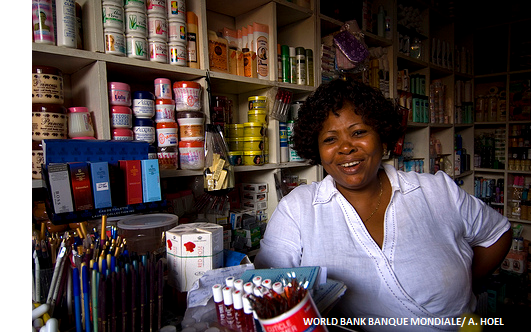Small informal businesses run by women account for a large share of market activity in many African marketplaces. However, the majority of these businesses are very small in scale, and the little existing evidence on their dynamics suggests that few of these businesses grow to the point of hiring employees. Recent literature has suggested that “managerial capital” or poor business skills can be a major constraint to production in developing countries, and a growing number of studies have attempted to measure the impact of providing business training to small firms – with at best mixed success, especially for female entrepreneurs. One potential reason that business training has not necessarily increased the growth of female enterprises is that standard business training programs typically ignore the role of gender. The International Labour Organization’s Gender and Enterprise Together (GET Ahead) training program differs from conventional business training materials by highlighting essential entrepreneurial skills from a gender perspective, addressing the practical and skill needs of women by discussing both practical business skills and how to operate in a context in which women often face a number of family and household constraints. The GET Ahead program and its effects on business growth of female microenterprises in Kenya will be the focus of this study.
Through a randomized control trial in four regions of Kenya, the study will seek to build on business training literature and to investigate the causal impact of the GET Ahead training program on the survival, profitability, and growth of those microenterpreneurs who receive training. Additionally, the research will examine the channels through which business training changes the operation of the business, as well as whether business training affects other businesses operating in the same marketplace. Specifically, the study will attempt to measure whether the gains to the trained come from a reallocation of sales away from the untrained, and from more exit and less new entry of other firms.
This study will address limitations in the existing literature, such as the low statistical power of many existing studies and the little amount of guidance offered as to the mechanisms through which training is operating when positive effects are found. The GET Ahead program is also unique in addressing the practical and strategic needs of low-income women in enterprise by strengthening their basic business and people management skills, and as such the program itself and its impact on market dynamics are of strong relevance to policy. Studying the impact of a business training program that explicitly takes gender into account could provide valuable insights for policies targeted at growing female microenterprises.
First appraisal on the general equilibrium effects of the project published on Development Impacts: "Can you help some firms without hurting others? Yes, in a new Kenyan business training evaluation" by David McKenzie.
Policy note from the project team: "Business training for female microenterprise owners in Kenya grew their firms without harming their competitors" by David McKenzie and Susana Puerto.






